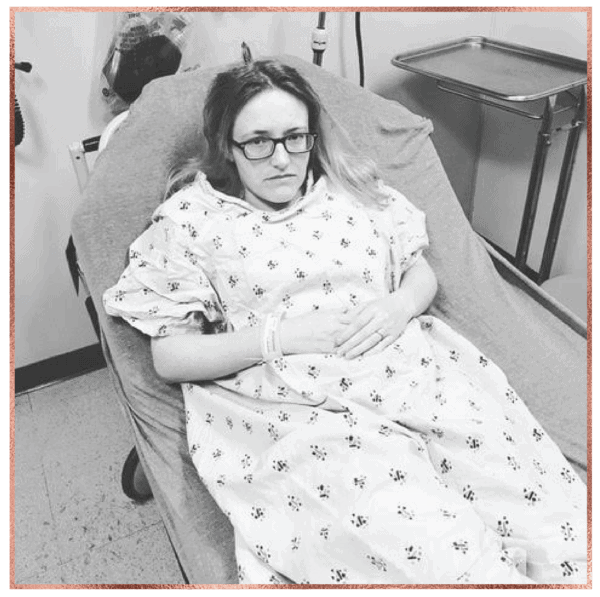Mary Katherine Mason, regular guest author at Undefining Motherhood, gives us the inside scoop about what it’s really like to live with Hyperemesis Gravidarum (HG). HG which is a rare pregnancy-related illness that has been likened to morning sickness’ monstrous (and much more dangerous) older brother. Previously an under-discussed ailment, moms were once told things like, “It’s all in your head” or even “HG isn’t real.” Hyperemesis stories are important to help us understand this rare pregnancy disease!
“Illness,” in fact, seems like a very mild word in relation to the stomach-turning reality that is HG. Much more than morning sickness, Hyperemesis gravidarum causes are have recently been linked to two specific genes, and Hyperemesis Gravidarum treatment simply involves treating the symptoms rather than the disease.
We’ll let Mary Katherine explain more. In this post, she will:
- Tell her HG story
- Explain what Hyperemesis Gravidarum actually is
- The ways in which HG can gaslight and confuse its victim
- The reality of HG and how it can include hospitalization and brushes with death
- The need for HG visibility

This site contains affiliate links, meaning that we earn a small commission for purchases made through our site. We only recommend products we personally use, love, or have thoroughly vetted.
- What Is Hyperemesis Gravidarum?
- Stories of the Severity of HG
- Self Criticism: Why Can’t I Handle Morning Sickness?
- My Hyperemesis Story: Living With HG
- The Story of My Last Hospitalization for HG
- Hyperemesis Is NOT Morning Sickness
- Resources
- Other Pregnancy Articles
- Trying to Conceive Articles
- Postpartum Articles
What Is Hyperemesis Gravidarum?
Imagine uncontrollable vomiting, to the point you feel like you’re drowning. All day, every day, for five to nine months. All while your body is working to grow a new life. That’s Hyperemesis Gravidarum (HG), which technically means the almost laughable “severe vomiting during pregnancy.”
That name makes HG sound like it’s a single bad episode of morning sickness. But mothers with hyperemesis stories know that HG is not that simple or a singular event. The nausea and vomiting are relentless and exaggerated to the point of dehydration, malnutrition, and often hospitalization. You can’t laugh at the definition because you don’t have the energy, and laughter makes you vomit or dry heave.

The Gaslighting Disease
Hyperemesis is one of the most confusing conditions. I often call HG a gaslighting disease because it gaslights its victims into thinking they aren’t strong enough to tolerate morning sickness. Most mothers with HG stories attest to the fact that they were belittled, made to feel “dramatic” by their sicknesses.
The fact that it’s constantly referred to as “severe morning sickness” perpetuates those myths.
After making it through two pregnancies with HG, I can assure you that Hyperemesis is not morning sickness.
Hyperemesis is a separate and serious pregnancy complication that can put both women and fetuses at risk without treatment.
WAY More Than Morning Sickness
Everyone is familiar with morning sickness. 80% of pregnant women experience some form of morning sickness.
Many of us find ourselves googling everything from home remedies to “when does morning sickness end.” It’s a desperate attempt to find anything, and I do mean anything, to help keep breakfast down.
But HG is not normal morning sickness.
It begins around week six, the same time as morning sickness, and on paper, the symptoms—nausea and vomiting—are similar. Most of those suffering from HG for the first time will simply think they have morning sickness. Those around us will, too. After all, everyone expects a bit of nausea early in pregnancy.
So let me be clear about this:
Hyperemesis is to morning sickness as a category-five hurricane is to isolated storms.
Stories of the Severity of HG
The level of nausea and vomiting quickly becomes overwhelming and debilitating. The HER Foundation was established to help women with HG. Their research indicates the following terrifying symptoms for women who are diagnosed with Hyperemesis. By the end of pregnancy, or the experience of hyperemesis (if it dissipates before birth), most women have experienced the following:
- Lost 5+% of their pre-pregnancy weight (usually more than 10%)
- Been hospitalized and administered IV fluids for dehydration
- Suffered from major nutritional deficiencies from excessive and uncontrollable vomiting
I have heard HG stories where the disease was so severe that women receive medical pumps for continuous anti-nausea medicine. Some even have feeding tubes. The HER Foundation has links to many medical studies about the use of PICC, PEG, and NG lines to treat HG. A few women even suffer miscarriages because of HG.
Marlena Fejzo has a devastating HG story. She is the geneticist who recently discovered two genes linked to Hyperemesis, miscarried while pregnant with HG. Her experience with the illness led her to research the condition.
Before IV fluids, Hyperemesis stories often had too dark endings to be told. Women with HG regularly died. The Victorian author Charlotte Brontë is now believed to have died during her pregnancy from Hyperemesis. Severe and resistant HG can still cause miscarriages, seizures, and organ failure in women.
I am lucky that my symptoms lessened around week 21. Most of those with HG will see some relief around week 20, but 10-20% battle HG until delivery.
Those women are truly warriors.

Self Criticism: Why Can’t I Handle Morning Sickness?
Self doubt and self criticism are huge parts of my HG story. I thought I was just being weak when I started having Hyperemesis in my first pregnancy.
Because these symptoms started when I expected to encounter nausea and morning sickness, I believed that I simply wasn’t being strong enough to handle pregnancy.
Every pregnant person I knew could work and perform daily routines while they had morning sickness. I couldn’t even keep down water.
I tried all the tycal morning sickness remedies: ginger ale, saltines, preggie pops, gin gin chews, unisom, ginger tea, sea bands, etc. Nothing helped. These are normally great fixes for morning sickness, but they don’t touch HG!
People around me kept offering advice and explaining that they, too, had been sick but had managed to keep working and doing things I could no longer do.
I received advice like, “Just tell yourself not to vomit” or “just force yourself to eat.” But eating a saltine or even swallowing my prenatal vitamins made me ill to the point of pulled muscles and popped blood vessels. I became convinced that it was my own personal weakness. That I was hurting my baby.
I felt misunderstood and completely alone, and even hesitated to open up to friends. Complaining about nausea during pregnancy seems silly, especially when some are struggling with fertility issues and pregnancy loss. Of course, I’m nauseous. I’m pregnant. I’m lucky. It’ll pass. Almost everyone deals with it, so why can’t I?
My Hyperemesis Story: Living With HG
During my two pregnancies with Hyperemesis, I never felt relief from my nausea, even after vomiting. I would vomit 20, 40, even 60 times a day.
My HG Timeline
In both pregnancies, my HG started as all-day nausea in week 6 and quickly led to vomiting during every meal.
Within days, I could no longer keep down any food or liquid. I would vomit from merely sipping water. I would vomit trying to swallow my own saliva. When I was too dehydrated to vomit anymore, I would dry heave just as many times.
When I had gone more than 24 hours without fluids, I would go to the ER for fluids. This is normal with HG stories. This is not normal with morning sickness.
The Severity of Sickness
The severity and urgency of the vomiting and nausea is different than anything I’ve ever felt otherwise. One writer described their partner’s symptoms as drowning by vomiting. This is not hyperbole.
I felt as if the synapses in my brain had misdirected. Vomiting became as regular and urgent as breathing. Trying to fight the nausea was like trying not to breathe. Even after one purging, I felt no relief before another would wash over me.
It was like the transition stage of labor. Waves of uncontrollable nausea and heaving would pass over me, uninterrupted, for days.
I had muscle and ligament injuries from dry heaving. I lost more than 10% of my body weight in both pregnancies, which led to me lying in bed or on the bathroom floor for hours.

What Are the Chances of HG Recurring in Later Pregnancies?
After I made it through my first HG pregnancy and gave birth to a healthy son, I assumed I would know how to handle another HG pregnancy. Maybe I wouldn’t even have HG this time. I thought my second HG story would be different; at least better.
But once you have a pregnancy with HG, there’s a high chance you will have it every subsequent pregnancy, and it often intensifies each time. One study found 81% of women had Hyperemesis in their second pregnancy after one with HG.
The Hyperemesis in my second pregnancy was worse. I couldn’t care for my son. I had to rely on my mother and husband for basic needs. I could no longer work. Eventually, I would be hospitalized. Multiple times.
The Story of My Last Hospitalization for HG
I remember barely being able to walk into the office for my OB appointment in late September of 2017. Around that time, I think I was around 14 weeks pregnant with my second child. I was embarrassed that I hadn’t been able to put on clothes and wore my pajamas.
I tried to shower and change clothes, but I couldn’t without dry heaving until I vomited bile. Before that, I had not kept down food or fluids in days. I had called out of work for the third time. It was at the end of my first trimester, the time morning sickness subsides but Hyperemesis peaks.
I had been ill since week 6. My midwives were aware, and I was prepared. I was on prescription medicine, but it wasn’t working as well as it had during my first pregnancy. This HG story looked very different than the first.
My symptoms were peaking. Despite weekly trips to the ER for fluids, I was still declining. The nurses took one look at me and sent me to the specialist who admitted me to the hospital. I never saw that specialist again, but I love her.
The next thing I remembered was being wheeled into the room and getting the yellow “banana bag” of vitamin fluids and my IV meds on a time-controlled drip. This miracle vitamin/medicine cocktail allowed me to sleep without dry heaving for the first time in months.
Medications for HG
I was relieved, but also scared.
I’m always anxious about taking medications during pregnancy, but with Hyperemesis, I had to take some medication in both pregnancies to assuage the constant vomiting.
I took Zofran (an anti-nausea drug developed for chemo patients), Phenergan (an anti-nausea medicine), and Diclegis (a combination of antihistamine and B-12 vitamins). Other medications that are often prescribed are Reglan, steroids, and antacids.
Those medicines helped me manage HG in my first pregnancy, and while they didn’t help as much in my second pregnancy, they are the reason my children and I are all alive today.
These medications are integral part of my hyperemesis story–they gave let me live to have my children!
It took two days of IV meds and fluids, and on the second morning, I ate a meal. It was the first I kept down and could actually taste in months.

As soon as I left the hospital, my symptoms returned, but for those two days, I felt like a slightly nauseous pregnant person who could eat food and keep down fluids. I think those two days helped me make it through the seven weeks I had left of HG.
Hyperemesis Is NOT Morning Sickness
Learning about Hyperemesis helped me understand that I was not alone in my misery. Other women told me their own HG stories. They also experienced the same debilitating level of nausea, the same cocktail of meds, and the same severe weight loss during pregnancy.
Other women had also felt like they were simply too weak to handle regular morning sickness. Other women reminded me that I was not weak.
Hyperemesis is very rare. Estimates suggest that it occurs in 1-3% of pregnancies. So, odds are that, unless you or a close friend have experienced it (and has been properly diagnosed), you may have never heard of it.
Kate Middleton and Amy Schumer have discussed being diagnosed and hospitalized for HG. Their hyperemesis stories put a spotlight on the illness. Yet even then, reporters and commentators often described HG as “morning sickness.”
A Myth We Must Stop Perpetuating
This language leads to the perpetuation of the idea that HG is an attention-seeking, “princess” condition for people who just can’t handle morning sickness.
Once I joined several online HG support groups, I heard HG stories that could have been my own. Women were told hurtful things like:
- “Suck it up!”
- “Stop seeking so much attention!”
- “Just deal with morning sickness like other women do.”
The myth that HG isn’t real has a historical basis. During the first half of the 20th century, Hyperemesis was often treated as a psychological disease. Male psychologists would accuse women suffering from HG as simply “seeking attention” and creating nausea in an effort to physically reject the fetus!

The Dangers of the “HG As Morning Sickness” Myth
Such dismissals of a serious medical condition leave many women feeling gaslighted and untreated. Historically, and somewhat today, this myth has left many women and babies to suffer unnecessarily, and even die.
These myths about HG still subtly persist. Many women I talk to have experienced friends and family accusing them of putting their pregnancy at risk, as if they have any control over their vomiting.
I’ve talked with women who spent $20,000 on IVF treatments after years of fertility issues, only to consider termination of a much-wanted pregnancy because they were about to go into organ failure.
These devastating hyperemesis stories show the dangers of not discussing HG.
Partners and spouses join support groups, confused about why this type of morning sickness means their pregnant partner is incapacitated and dangeroulsy thin. “Is she just making it worse than it is? Is she just overly dramatic?” Many loved ones watching Hyperemesis from the outside ask these questions.
The answer is always no. She’s actually fighting for her life.
Many women tell Hyperemesis stories of dismissive doctors who refuse to hospitalize or medicate them for simple morning sickness. In a recent study, 50% of HG sufferers said doctors did not believe their stories when they discussed the misery of HG. Only 34% said they received the support and medicine they need.
I had to advocate for my first HG diagnosis myself, and I was lucky to have educated midwives. Advocating for yourself while you are pregnant, dehydrated, and vomiting up to 60 times a day is immensely hard.
HG Moms: You Are Not Alone
One reason I choose to write about my experiences with Hyperemesis is to dispel the notion that HG is just morning sickness. That these survivors are being overly dramatic.
I understand how it could seem that way if you’ve been through morning sickness but never seen how different HG can be. But the crippling and completely debilitating nature of Hyperemesis is completely different from morning sickness.
Every representation, every Hyperemesis story, is a chance to spotlight a condition that many never encounter.
The complete isolation and confusion I felt when I first experienced HG could have been improved if I had seen or heard any HG stories before. If my friends and family knew how debilitating and serious it can be, I would have had strong allies from the beginning.
This is what I wish for the tens of thousands of women suffering with HG right now: to feel validated, to feel seen, to feel empowered.

Resources
Recent research is so exciting for HG moms! Check it out here!
If you know someone with Hyperemesis and want to learn more about how to help, visit the HelpHer guidelines here.
If you think you might have Hyperemesis, visit this page to learn about symptoms.
Tell us your HG story in the comments!
Other Pregnancy Articles
- Unusual early pregnancy signs
- When to announce a pregnancy on social media, to family/friends, & at work
- Pregnancy care package
- Hospital bag checklist printable
- Birthing checklist (how to write a birth plan)
- Getting ready for a baby checklist
- Baby registry must haves
- How to prepare for labor induction
Trying to Conceive Articles
- Best way to track ovulation
- TTC tips
- 2ww ttc (surviving the two week wait when TTC)











My daughter is her 3rd HG pregnancy! I might add she is a single parent ! In all these support groups we are in all the women have partners or husbands ! What about those who don’t have either ! My daughter has two children to look after with only support from me her mom who lives 20miles away doesn’t drive and works full time. There is no support out there for her ! She also has had to advocate for herself and fight and I mean fight with each and every time she is hospitalised for drugs that will help her ! She often can’t get out of bed on a morning because she has been up vomiting all night ! There is not enough knowledge out there about HG.
Welp, showed my sister this article and she seems to think I am overreacting 🤦🏻♀️ she too had horrible morning sickness, couldn’t keep anything down and lost a ton of weight. She just thinks it’s normal. I am so confused!
Oh, mama. It is NOT normal. Your sister deserved better and so do you! Medical providers used to be highly insensitive to it because there just wasn’t enough research, so her doctor may have made her feel like it was normal. But it wasn’t and now we have proof. You can get support. Advocate with your doctor IMMEDIATELY. And check out this link for a little extra validation and support: https://www.hyperemesis.org/news/nature2023/